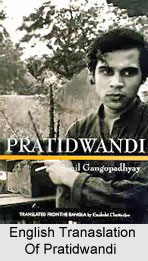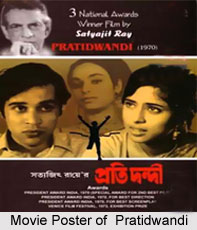 Ingrained in the post independence arena of 20th century the, novel Pratidwandi is the representation of the drab society, which was infested with shattered economy and emotional and spiritual aridity. The lack of purpose, which ultimately inculcates frustration and cynicism in human mind, is the principal theme of the novel, Pratidwandi. Unlike the other novels of Sunil Gangopadhya, the society and the individuals as a part of that society is the concerning idea of Pratidwandi. Joblessness, cynicism, deaparation, dejection, clash between generations, exasperated discontent exploding into violence and finally a glimpse of optimism, which are the feature of the contemparary society are the major concerns of Pratidwandi.
Ingrained in the post independence arena of 20th century the, novel Pratidwandi is the representation of the drab society, which was infested with shattered economy and emotional and spiritual aridity. The lack of purpose, which ultimately inculcates frustration and cynicism in human mind, is the principal theme of the novel, Pratidwandi. Unlike the other novels of Sunil Gangopadhya, the society and the individuals as a part of that society is the concerning idea of Pratidwandi. Joblessness, cynicism, deaparation, dejection, clash between generations, exasperated discontent exploding into violence and finally a glimpse of optimism, which are the feature of the contemparary society are the major concerns of Pratidwandi.
Author:
The prolific writer of 20th century Sunil Gangopadhya, born in 7th September 1934 in Faridpur. A true child of post modernism in 20th century, Sunil Gangopadhya observed all the social drabness and the spiritual barrenness of the individuals dwelling the society. Essentially a social intellectual, Sunil Gangopadhya has made a deep introspection of the human beings and their respective sociopolitical conditions. Sunil Gangopadhya was concerned about the common run of men who are the nodal agency of a society yet are deprived from the desirable condition of living. His novels are the vivid picture of the time and the scathing criticism of the social dullness including the individual aridity.
Synopsis:
Set on the background of a political turmoil of Naxalite era in Bengal, Pratidwandi is the story of rampant corruption and unemployment.
 In the dingy socio-political panorama of late 1960s, Pratidwandi depicts the story of Siddhartha, a modern educated man gradually becoming the prey of tumultuous socio-political condition. Having experienced the better days, Siddhartha had not any knowledge about what poverty is. It was after the death of his father and when the tea estates all are lost, Siddhartha, being the eldest son, is entitled to carry the responsibility of the whole family. Thus he came in close contact in the huge concourse of frustrated young generation, who are jobless in spite of being educated. Inflicted with cynic ennui, Siddhartha was mortified, when his younger sister had to go out to earn money in the presence of his elder brother. Also tormented by the involvement of his brother in the Naxalite activities, Siddhartha became the victim of his own nuisance. He could neither align himself with his revolutionary activist brother, or career-oriented sister. His sister`s outrageous behavior develops his strong detestation against the women. Humiliated with his own failure, Siddhartha was caught in a sense of identity crisis. However, being an optimistic social prophet, Sunil Gangopadhya, brings in Pratidwandi, a recurrent motif of romanticism, marked with a glimpse of optimism. The call of a strange bird, while he was writing letter to his beloved in Balurghat, preoccupied Siddhartha with the memory of the childhood days even in his ennui. In the concluding part of the novel Pratidwandi, the optimistic note is explicit enough, when, in the chants of funeral procession, Siddhartha can feel the rebirth of childhood tranquility, out of the dark, monotonous society.
In the dingy socio-political panorama of late 1960s, Pratidwandi depicts the story of Siddhartha, a modern educated man gradually becoming the prey of tumultuous socio-political condition. Having experienced the better days, Siddhartha had not any knowledge about what poverty is. It was after the death of his father and when the tea estates all are lost, Siddhartha, being the eldest son, is entitled to carry the responsibility of the whole family. Thus he came in close contact in the huge concourse of frustrated young generation, who are jobless in spite of being educated. Inflicted with cynic ennui, Siddhartha was mortified, when his younger sister had to go out to earn money in the presence of his elder brother. Also tormented by the involvement of his brother in the Naxalite activities, Siddhartha became the victim of his own nuisance. He could neither align himself with his revolutionary activist brother, or career-oriented sister. His sister`s outrageous behavior develops his strong detestation against the women. Humiliated with his own failure, Siddhartha was caught in a sense of identity crisis. However, being an optimistic social prophet, Sunil Gangopadhya, brings in Pratidwandi, a recurrent motif of romanticism, marked with a glimpse of optimism. The call of a strange bird, while he was writing letter to his beloved in Balurghat, preoccupied Siddhartha with the memory of the childhood days even in his ennui. In the concluding part of the novel Pratidwandi, the optimistic note is explicit enough, when, in the chants of funeral procession, Siddhartha can feel the rebirth of childhood tranquility, out of the dark, monotonous society.
Pratidwandi means a competitor. Here Siddhartha, representing the entire young generation of dreary society of post modernism, where the young man like him stands as a victim of the socio-political turmoil. The title Pratidwandi signifies the rebellion of Siddhartha against the unfeeling bureaucracy and he became the "Pratidwandi" or competitor of all the victims of bureaucracy, represented by his sister. The title" Pratidwandi" aptly justifies the very spirit of the novel, concerning the frustration and cynicism and finally a foretaste of optimism, of the protagonist Siddhartha, the replica of his generation.













